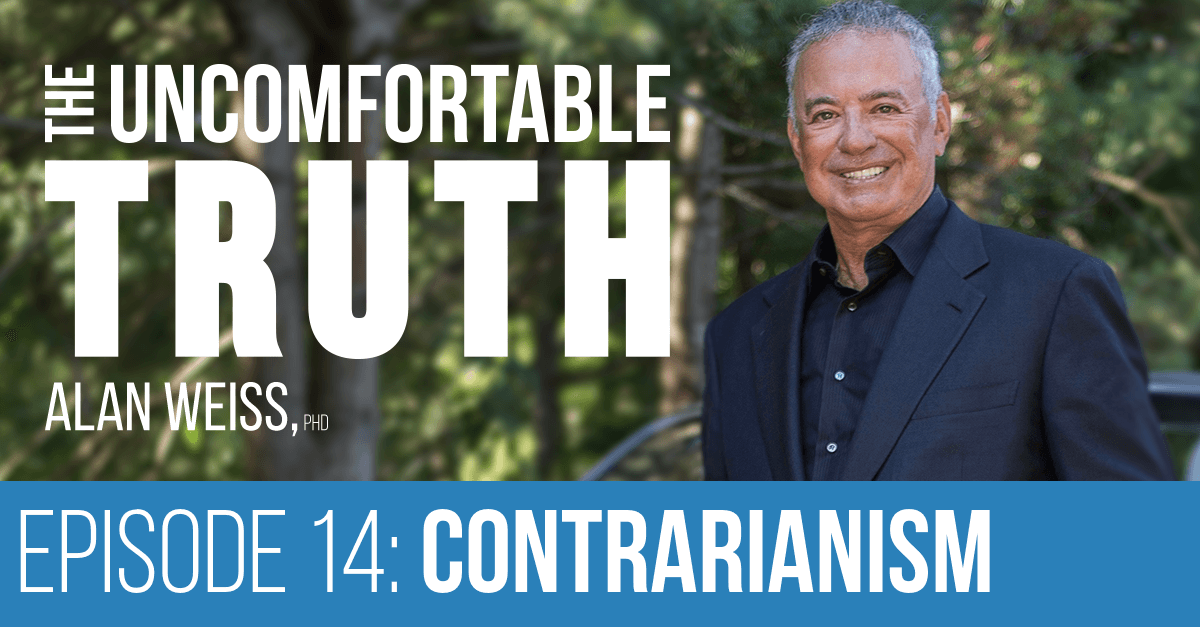
Episode 14: Contrarianism
“Why taking an opposite view is a public service and how to do it.”
Transcript:
I'm Alan Weiss and The Uncomfortable Truth today is about contrarianism. Yes, that's right. My very first brand was “the contrarian.” At the time, quality was the big deal. Quality circles, lean and quality approaches, and black belts about quality. So, I wrote an article about how quality pursuit is wrong, I said quality doesn't create anything and that being lean isn't necessarily good. “The Myth of Quality Circles” I called it.
After it was published by a periodical in Boston, it was comparable to the Frankenstein movies of the 1930s and villages were marching up the hill with pitchforks and torches and every human resources person in the world was attacking the article. The publisher said to me, “Listen about the article,” and I said, “I'm really sorry I didn't mean to cause you harm,” and he said, “Kid, write an article every month for me like that I'll pay you 50 bucks.” I said, “But they hated it.” He said, “They read it,” and that taught me a lot.
What I'm telling you today about The Uncomfortable Truth is that it's important, more than ever perhaps, to be a contrarian. I don't mean ornery, I don't mean curmudgeonly. Andy Rooney was a curmudgeon. I don't mean being a nihilist, where you want everything destroyed – I mean finding a reverse view. Now, what do I mean by that?
Well, take a hackneyed phrase, take a stale aphorism like “the customer is always right.” You don't have to say “the customer is never right” but you could say “not every customer is right.” Years ago, the Ritz-Carlton, prior to Marriott buying it, had a policy where any employee could offer goods and services up to $2500 in order to please an unhappy guest.
Somebody might get a free dinner, a free drink or a free night, and this was the way of the hotel providing that kind of service at the frontline. We talk about what goes up must come down, well, not so much – we've had a space station up there for a long time. We've got vehicles traveling outside of our own solar system. We have solar planes that can stay up presumably upon further development – forever.
What goes up doesn't have to come down and that includes the stock market. You know people say, “Well it's due for a crash, it has to come down,” it has corrections, but I think over the last year alone it's gained thousands of points. “Ready, aim, fire” is silly. Actually, “aim and fire” is pretty good by themselves, getting ready wastes a lot of time.
When I ran track, they said “get ready, get set, go.” Getting ready just built your nerves up, it made you crazy. Really, you just wanted to get in the blocks, get set and hear the gun go off as fast as possible. Ten seconds later it was over and you either won or congratulating the winner. The same thing is true in business, too many people are afraid to pull the trigger. They get ready, ready, ready but they never fire. I know a lot of people who if they had gone through with the plans they've been talking about for the last year would be a lot better off today, you know them too. Some of them are you.
Bring people to the food, that's what we've always done. The Delmonico Steak is named after the restaurant Delmonicos, which was the first public restaurant in New York. People used to eat at home, they didn't go to a common place to eat, it was unthought of, unseemly, but then they did. The wealthy people in New York went to this restaurant called Delmonico and hence they have a Delmonico Steak. That was the rule of culinary art until people started bringing food to the people instead of people to the food.
And so, you can drive through a fast food restaurant and get yourself food, or you can have food delivered to your home. Meals on Wheels takes care of the elderly. You can get all kinds of food delivered to your home depending on the size of your city and the sophistication of the delivery services. In terms of contrarianism, the challenge to the basic premise or the operating theory is key and not the actual intended action.
Instead of arguing about what kind of sales training is needed, talk about why someone feels sales training is required in the first place. “We need alignment,” that's great these days. I have no idea what the hell it means. It's like the speakers who get up and talk about authenticity when they're telling the same joke 100,000 times and still laughing at it and crying all the time at four and a half minutes into their program. Yet, they're talking about authenticity.
I also, by the way, have a hard time listening to speakers telling me to take control of my life when they weigh 400 pounds, but I digress. What is alignment? Instead of saying, “Well, there are seven different ways to get alignment,” say, “What are you talking about? If you had alignment, how would the place look different?” What's a future state with alignment look like compared to where you are today?
There was a fellow who worked with me for quite some time in my coaching program. He's written a couple of very good books, maybe more, and he's very successful with a seven-figure business and works with major companies. This is a habit of many good people – they chase money. They chase money they don't need and they take on business they shouldn't take. He was dealing with Fortune 1000 companies, let's say, and a law firm called him and said, “Look, we think you'd be a great coach for our top attorney, she's our top producer but everybody in the office complains about her. She's abrupt. She overrides people. She shouts them down. She thinks she's smarter than everyone else, and so we'd like for her to get along better with people and we've had a succession of coaches that haven't worked.”
He said to me, “What do you think? It's $15000 and I can do it over the course of a week and I'm in town anyway.” I said, “You're crazy,” she's exhibiting the behaviors that have made her a success. The basic premise here is wrong. In other words the point isn't that she get along with her colleagues who don't produce as much. The point here is she's bringing in seven figures to the law firm annually. Maybe other people better get along with her, or emulate her behaviors in the courtroom, but she's going to eat you up and spit you out. He said, “No, no, no. I can help her get along better with people and It'd be fine.”
Well, about a day or two after he got there she complained to the partners that this guy was a waste of time and if they didn't get him out of there she was going to leave, and so he got booted out. The point is, the partners should have fired anybody who didn't get along with her. Their basic premise was wrong. Ask why and not how, if you think of decision making is coming in a chain. In other words, “I need transportation.” My next decision is, “I think it will be a car.” My next decision is, “I think I'll lease the car instead of buying or renting or stealing it.” My next decision is, “I want a sports car.” My next decision is, “Should it be domestic or foreign,” and so forth and so on.
That's a decision chain. When you ask how to do things, you go down the chain, you become tactical. But if you ask why you're doing it, and that's the confrontation I'm talking about, you go up the chain and you become more strategic. Why are we even thinking about this? Maybe you should have a car and a driver. Pushing back on a basic and especially false premise doesn't seem like contrarianism, but it is. The key is, don't try to please people – earn their respect. This PTP, Propensity To Please, is killing people I know, there's a difference between affection and respect.
We're not in this business to have people like us, we're not in this business to gain external validation. We're in this business to use our internal validation to help others. We want to gain people's respect by offering them value, and there is value in being contrarian and pushing back on basic premises. If you want a lot of affection, get a dog. If that's insufficient, get two dogs. Don't focus on trying not to lose business because when you focus on not losing business, you become a yes person, and you're seeking to be loved, then you want to be compatible. Focus on being who you are and opposing what seems silly or opposing what even seems reasonable if you can bring it to a more interesting and provocative conclusion.
There's a real need for contrarianism. Remember the segway? I mean this guy had invented heart stints and all kinds of valuable, important and useful mechanisms. He actually thought that he would sell 250,000 segways the first year and that people would be using these in cities to get around. Of course, he hasn't sold 50,000 in their lifetime so far, not a fifth of that. It's used by people in warehouses, by some postal workers in huge facilities and it's used in warehouses by people who have to go a long distance and I notice it's used by police on boardwalks during the summer on the Jersey Shore, but so what? You even see some segway tours in Prague.
There's a guide and five people following on segways with their helmets on, which is kind of preposterous because Prague is known to be a walking city. There's a need for contrarianism, somebody should've said the segway won't work and here's why it won't work – because people aren't going to use it, and here's why they're not going to use it.
The feeling in this last election was that women, minorities, and the working class, “blue collar workers,” would vote in large numbers for Hillary Clinton.
They would come out and just smother the numbers for her, and she would take all those states where these big cities provide those kinds of groups. And, of course, women did not come out in those numbers particularly white women and that was not misogyny. She had huge, unpopular ratings among women. Minorities did not come out like they did for Obama's first term, they didn't even come after him in the second term this strongly. Blue collar workers were not interested in what they considered to be failed promises from the Democrats.
Now, this isn't a political statement. I'm just pointing out that the election shocked people because nobody pushed back and said, “What is the validity behind these premises you have which have almost become mythological?” Remember when you could only distribute music through recording companies? The big stars like Taylor Swift have taken that in their own hands and distribute directly through electronic and digital media.
There was a time when people said, “No one will watch ballroom dancing, it's a cult,” and people today will go to ballroom dances, enjoy the ballroom dancing, and they'll watch these very elegant competitions, it's almost like a horse show. Then they had this show called Dancing With The Stars, in England, and they took it to the head of TV production at ABC in Los Angeles, who's a woman, and she said, “It would never work here, I won't even think about it or discuss it.”
They begged her just watch one show, she finally relented and she watched one show and now Dancing With The Stars in the U.S. is one of the most highly rated reality shows on TV. It's in its 20th or 21st season, they run two seasons a year, and it's rapidly watched including by yours truly because it's pretty funny and it's fascinating. People will watch a professional dance show. Let me be contrarian and tell you that they'll flock to one.
There are still newspapers today. The computer has not done away with newspapers. There are still hard copy books, there are still checks, there's still paper in offices. Remember the paperless office?
I don't know about you but my computer and the transactions I do produce a huge reel of paper that needs to be printed out of my printer. There's still broadcast TV, cable hasn't done away with it. In fact, there's still AM radio which is serving a real purpose. For that matter, snail mail is still here – I've got a pile on my desk. The question wasn't, “When will they disappear?” That was the stupid question. A checklist society, a paperless society. Digital books will replace hard copy books. These were all erroneous assumptions because, by the way, the last time I looked in 2016, the biggest decline in book sales was among eBooks, electronic books that were down 4%, hard copy books were up.
The stupid question is “When will they disappear?” But the intelligent question is, “What's their future role?” That's a different kind of question, it's a contrarian question. We don't live in an on/off switch world. There might not be as many hard copy books, but there will still be a lot of them, what's their role in the future? Why would people print them? Who would buy them?
The paperless office never came to pass, neither did the checklist society, the question has to be different. It has to be more contrarian. We now have home banking and we have home schooling. I talked about food coming to the consumer, education has come to the consumer. Home schooling has proven to be very popular, nontraditional degrees of high quality – very popular. Digital courses – very popular.
Education is coming to the user and consumer, and so will other things, like health care. We will be able, through telehealth, to show on our iPhone, a mole, or a rash or an allergic reaction, and a doctor somewhere else in the country or somewhere else in the world will advise us on what to do, and whether we need to see a physician in person or buy a certain over-the-counter medicine, or perhaps he or she will actually send a prescription to our local pharmacy.
Healthcare is coming home. Hospitals are expensive, and by the way, last year something like 40% of the deaths that occurred in hospitals were iatrogenic. Iatrogenic means they were caused by the hospital. Think about that. If you want to be contrarian, ask the reverse question, not “How do we sell this?” but “How will they buy this?” Don't accept givens and myths. The early bird gets the worm, but the early worm gets eaten. Don't accept the traditional conventional wisdom, it's not conventional, it's not really wise, otherwise it's fine.
Don't seek to please, make an impression, make a dent, make a chink in the armor, earn respect and don't be afraid to fail. There is no such thing as playing it safe. We're not here to stick our toe in the water. We're here to make waves.
For my live streaming audience here on September 21st and 22nd, I'm running a special Lifestorming session in New York. I'm limiting it to 12 people, we're going to see the best places, eat at the best restaurants, talk about the best business techniques, all in luxurious settings, all included, yes your meals and ground transportation as well. You just have to pay to get there.
The fee is going to be $15,000, but if you mention that you're a member of my live streaming series, I'll take $3,000 off. Only 12 people, we already have three if you want to sign up, email [email protected] or ask whatever questions you have.
Thanks for being with me today.







Dave Wakeman
This is my favorite podcast episode that Alan has done. If you haven’t listened, you should download it and listen whenever you get frustrated or fear that by challenging the conventional will set you back.
Alan Weiss
Thanks, Dave!